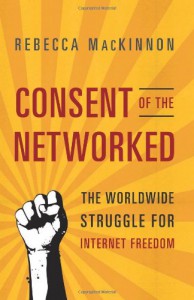
Rebecca MacKinnon
4.0 out of 5 stars an excellent overview of the ideas and forces shaping Internet policy debates globally January 25, 2012
By Adam Thierer
MacKinnon's book is well-researched exploration of the forces driving Internet developments and policy across the globe today. She serves up an outstanding history of recent global protest movements and social revolutions and explores the role that Internet technologies and digital networks played in those efforts. In particular, her coverage of China and the Net is outstanding. She also surveys some of the recent policy fights here and abroad over issues such as online privacy, Net neutrality regulation, free speech matters, and the copyright wars. It is certainly worth reading and will go down as one of the most important Internet policy books of 2012.
Her book is an attempt to take the Net freedom movement to the next level; to formalize it and to put in place a set of governance principles that will help us hold the “sovereigns of cyberspace” more accountable. Many of her proposals are quite sensible. But my primary problem with MacKinnon's book lies in her use of the term “digital sovereigns” or “sovereigns of cyberspace” and the loose definition of “sovereignty” that pervades the narrative. She too often blurs and equates private power and political power, and she sometimes leads us to believe that the problem of the dealing with the mythical nation-states of “Facebookistan” and “Googledom” is somehow on par with the problem of dealing with actual sovereign power — government power — over digital networks, online speech, and the world's Netizenry.

